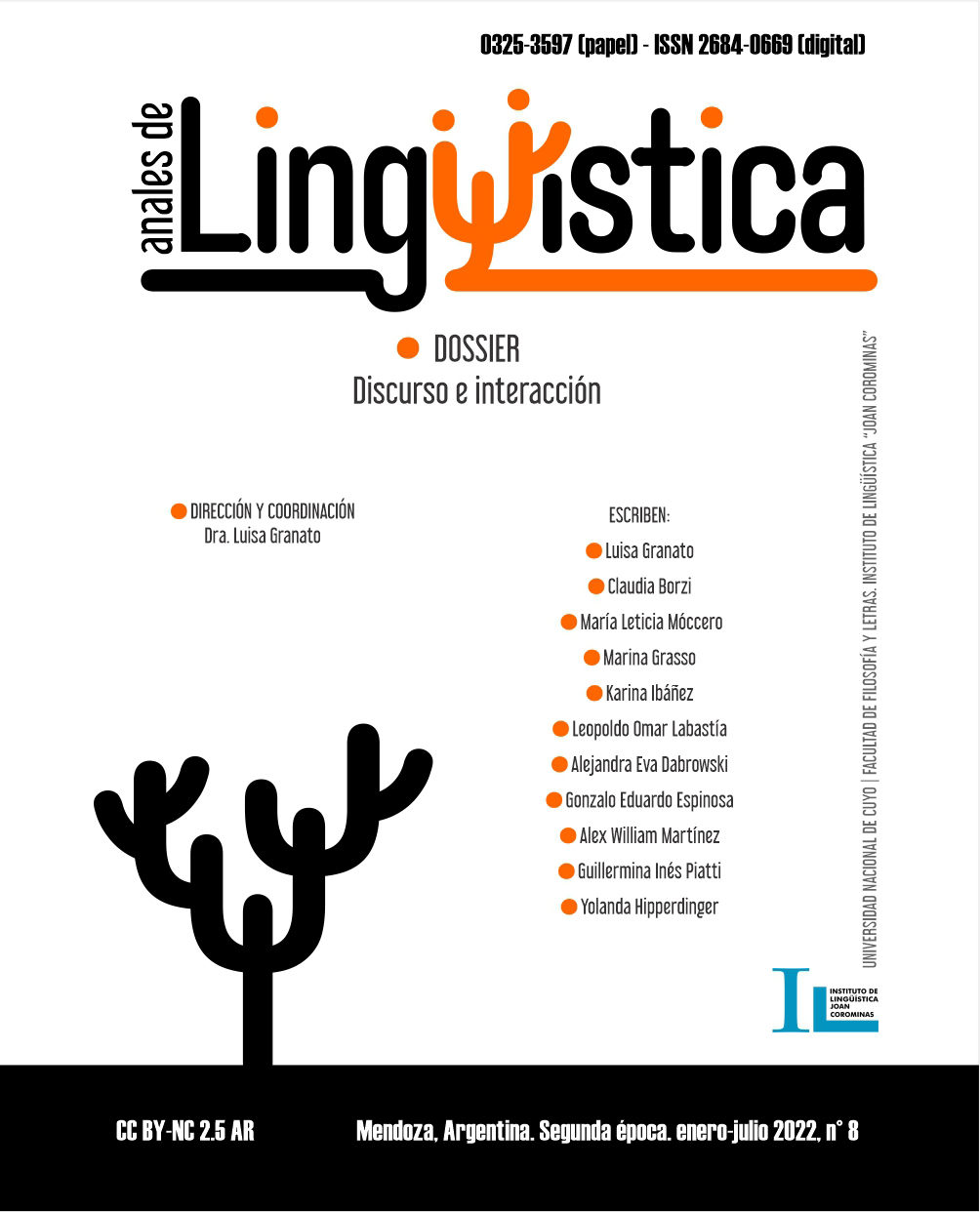Foreign Words Pronunciation in a Political Key: Details of the Scioli-Macri Debate (and its Repercussions)
Keywords:
presidential debate, pronunciation, foreign words, divergence, receptionAbstract
In 2015, a presidential election in the second round took place in Argentina for the first time. Among the various instances of public exposition of the opinions and proposals of Daniel Scioli and Mauricio Macri, the candidates for the presidency with the most votes in the corresponding general elections, the debate that took place between both candidates in the School of Law of the University of Buenos Aires, one week before the ballotage, occupied a preponderant place. This interaction was a strictly regulated one, in which the candidates had, alternately, brief periods of time to present their vision and action plan relative to previously defined thematic groups, as well as to ask and answer each other. The strategies that Scioli and Macri used in this framework, with restricted possibilities but with extreme public visibility, were widely analyzed by political analysts and discurse scholars. However, the phonetic-phonological peculiarities of the respective interventions, which were conversely discussed at that time by users of different social networks, have not been a specific object of attention yet. This paper constitutes a first approach to the analysis of these peculiarities, with the focus on the divergent realization, in relation to the conventional one, of lexical units recognized as non-Spanish: details that, although ignored even in the published transcriptions of the debate, were "denounced" in comments and virtual exchanges that (in a wide spectrum of inferences) gave these atypical pronunciations an indexical character regarding the supposed personal characteristics of the candidates.
References
Cabré Monné, T. (6 de mayo de 2010). La adaptación de préstamos en catalán. Recuperado de http://www.cervantes.es/imagenes/File/lengua/jornadas/Teresa_ Cabr_Monn_2010IC.pdf
Fontanella de Weinberg, M. B. (Coord.) (2000). El español de la Argentina y sus variedades regionales. Buenos Aires: Edicial.
Giavarini, R. M. (2017). La campaña publicitaria de los candidatos Daniel Scioli y Mauricio Macri en Facebook y Twitter previa al balotaje de 2015 (Tesis de Licenciatura). Rosario: Universidad Abierta Interamericana. Recuperado en abril de 2019, de http://imgbiblio.vaneduc.edu.ar/fulltext/files/TC123786.pdf
Gumperz, J. J. (1999). On Interactional Sociolinguistic Method. En: S. Sarangi y C. Roberts (Eds.). Talk, Work and Institutional Order: Discourse in Medical, Mediation, and Management Settings (pp. 453-471). Berlin: Mouton/de Gruyter.
Hipperdinger, Y. (2010). Sobre préstamos y apellidos. Convencionalización, alternancia y valoraciones en español bonaerense. Bahía Blanca: EdiUNS.
Hipperdinger, Y. (2014). Convencionalización y adaptación en español bonaerense. Aporte al estudio de las importaciones léxicas. Anuario de Letras. Lingüística y Filología, II (2), pp. 35-58.
Hipperdinger, Y. (2016). Importaciones léxicas en español bonaerense: compromiso fónico y convencionalización puntual. En: Arce, L. (Ed.), Entramados sociolingüísticos: variación, historia y comunidad (pp. 269-290), Bahía Blanca: Sociedad Argentina de Lingüística-EdiUNS.
Miotti, R. (2008). La pronunciación de los anglicismos técnicos en dos lenguas de especialidad. En: C. Navarro, R. Rodríguez Abella, F. Dalle Pezze y R. Miotti (Eds.), La comunicación especializada (pp. 273-295), Bern: Peter Lang.
Montani, R. (2007). Hablar, anotar, comprender, explicar: reflexiones sobre el lugar de la lingüística en la etnografía. En: A. Fernández Garay y M. Malvestitti (Eds.), Estudios lingüísticos y sociolingüísticos de lenguas indígenas sudamericanas (pp. 125-144). Santa Rosa: Universidad Nacional de La Pampa.
Myers-Scotton, C. (1993). Social Motivations for Codeswitching. Oxford: Clarendon Press.
Pérez Zamora, E. (2018). Contradestinación inclusiva. El discurso de Macri y Scioli en Facebook. Inmediaciones de la Comunicación, 13 (1), pp. 137-157. Recuperado de https://revistas.ort.edu.uy/inmediaciones-de-la-comunicacion/article/view/2829/28 39
Ventura, A. S. (2018). Cuestión de imagen: análisis de los mensajes de Twitter de los candidatos presidenciales argentinos durante el debate previo al ballotage 2015. Soprag 6 (1): 1-32. https://doi.org/10.1515/soprag-2017-0015
Downloads
Published
How to Cite
Issue
Section
License
Copyright (c) 2022 Yolanda Hipperdinger
Esta obra está bajo una Licencia Creative Commons Atribución 2.5 Argentina.
Los/as autores/as que publican en esta revista están de acuerdo con los siguientes términos:
1. Los/as autores conservan los derechos de autor y garantizan a la revista el derecho de ser la primera publicación del trabajo bajo una licecncia Creative Commons Atribución 2.5 Argentina (CC BY 2.5 AR) . Por esto pueden compartir el trabajo con la referencia explícita de la publicación original en esta revista.
2. Anales de lingüística permite y anima a los autores a difundir la publicación realizada electrónicamente, a través de su enlace y/o de la versión postprint del archivo descargado de forma independiente.
3. Usted es libre de:
Compartir — copiar y redistribuir el material en cualquier medio o formato
Adaptar — remezclar, transformar y construir a partir del material para cualquier propósito, incluso comercialmente.






